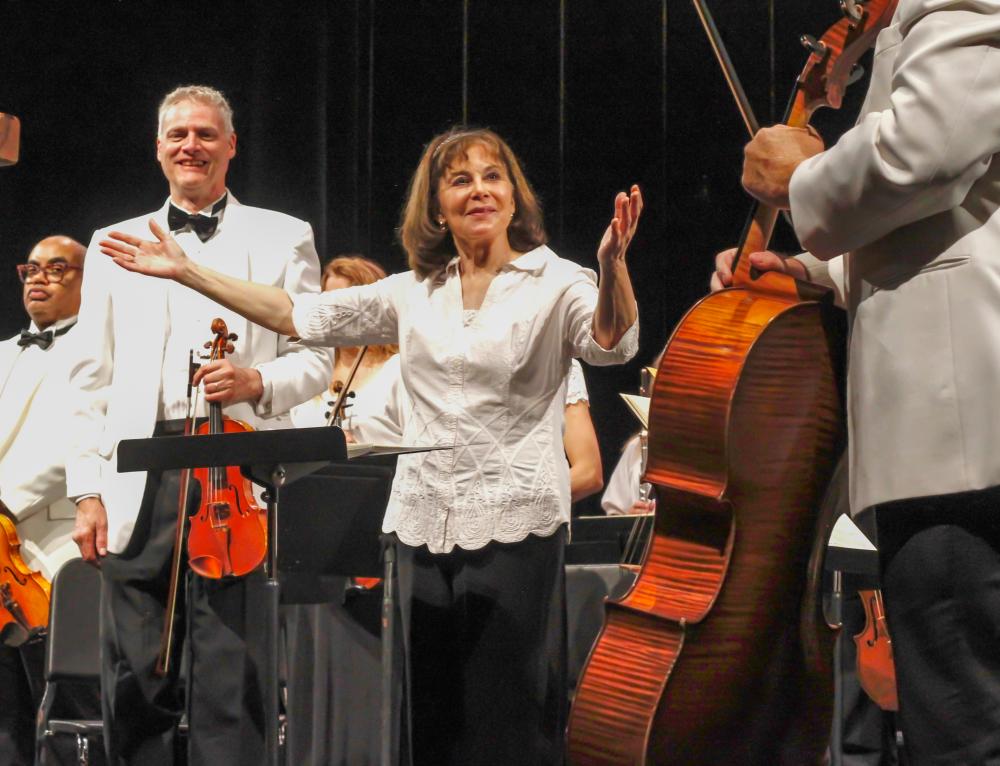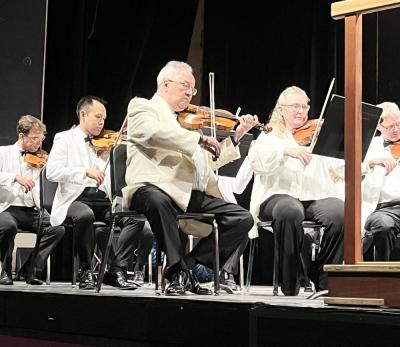Buzzards Bay Musicfest concludes 27th season
MARION — Buzzards Bay Musicfest finished its 27th season on a high note, delivering a diverse program to sold out or nearly sold out audiences every night of the five-day festival.
“I thought it was a grand slam! A home run,” said Philip Sanborn, Executive Director of the festival.
From Wednesday, July 9 through Sunday, July 13, various ensembles performed different instrumental genres of music at Fireman Performing Arts Center in Tabor Academy, ranging from jazz to orchestral to smaller chamber ensembles.
Acclaimed musicians from across the country make their way to Marion to perform in the festival, including Los Angeles-based horn player James Thatcher who has recorded over 3000 film scores in his career.
“Forrest Gump, Titanic, Jurassic Park, Star Trek, Avatar. I did about 65 films with John Williams and over 60 with Horner,” he said, adding that Williams once stated he was his “favorite guest.”
Grammy-Award winning conductor JoAnn Falletta commenced the season on Wednesday with a classical program, launching the symphony orchestra into spirited renditions of classical pieces including Mozart’s Overture from “Le nozze di Figaro,” Beethoven’s “Symphony No. 2 in D major” and Stamitz’s “Viola Concerto No. 1 in D major.”
The conductor was named one of the 50 greatest conductors of all time by Gramophone Magazine and currently serves as music director of the Buffalo Philharmonic and Music Director Laureate of the Virginia Symphony. During her time at The Julliard School, Falletta studied under Leonard Bernstein who went on to mentor her for decades.
Austin-based musician Jonathan Gunn, principal clarinet of the Buzzards Bay Musicfest, described working with Falletta at the festival as “really easy” and “very pleasant,” calling her a “great musician and conductor.”
“The leadership is just palpable,” said Sanborn.
Thursday night’s concert featured chamber music, including a flute, viola and harp trio performing Debussy’s “Sonata for Flute, Viola and Harp.”
“String Quartet in B Minor” by composer Samuel Barber was also performed at the show, which Sanborn describes as “a haunting tune [that] has been on the soundtracks of countless movies.”
Gunn stated that he always relished the opportunity to play Brahms’ “Clarinet Quintet in B Minor,” which was performed Thursday night.
“Brahms is so much fun to play. It’s incredibly romantic, expressive. I’ve played it a number of times but it always somehow seems to be kind of a bucket list kind of piece to play,” he said.
Friday’s sold-out concert featured “an hour and a half of the history of jazz” that goes “all the way from Scott Joplin to David Brubeck,” according to Sanborn.
“It’s a fun group, the swing band, because there’s some of the best jazz players in New England,” he said.
Saturday’s chamber music night featured “more edgy in terms of the repertoire,” according to Sanborn.
The ensembles played a Valerie Cole piece for a woodwind quartet, which Sanborn called “fantastically wild,” in addition to an Arnold Bax piece for flute, viola and harp that was described as “ethereal.”
The festival finished with an orchestral performance on Sunday night. Under the command of Falletta, the orchestra performed “St. Paul’s Suite in C major “by Gustav Holst, “Sinfonia Concertante in B-flat major” by Franz Haydn, Mozart’s “Symphony No. 29 in A major” and Max Brunch’s “Kol Nidrei, Adagio for Cello and Orchestra,” which featured soloist John Walz.
“He’s fantastic. He’s from Los Angeles, and does a lot of solo work out there,” said Sanborn of Walz. The piece was played in dedication to the life of John Mills, a festival board member who passed away recently.
Sanborn said the weekend was a major success for the festival, with packed audiences and memorable performances.
“The full orchestra, the multiple chamber groups, the swing band, all of them were at the top of their game and they performed magnificently,” he stated.
















